Carole Terwilliger Meyers's Blog, page 28
March 7, 2017
Things to Do: Sara D. Roosevelt Park, NYC
Sara D. Roosevelt Park This 7.85-acre park underwent a $5 million renovation in 2011. It features a soccer field, track, roller-skating rink, basketball courts, two playgrounds, and a senior center.
 promenade at Sara D. Roosevelt Park in NYC
promenade at Sara D. Roosevelt Park in NYC● Houston Street Playground
● Rivington Street Playground
● Hester Street Playground On Hester St., between Chrystie and Forsyth Sts. Facilities include colorful play structures with padded ground beneath, a large sand pit, swings, and an enclosed toddler area. The area is unshaded, but in summer an assortment of water features operate. Picnic tables--which tend to be in use by adults playing card games--and restrooms are available.
 Hester Street Playground in NYC
Hester Street Playground in NYC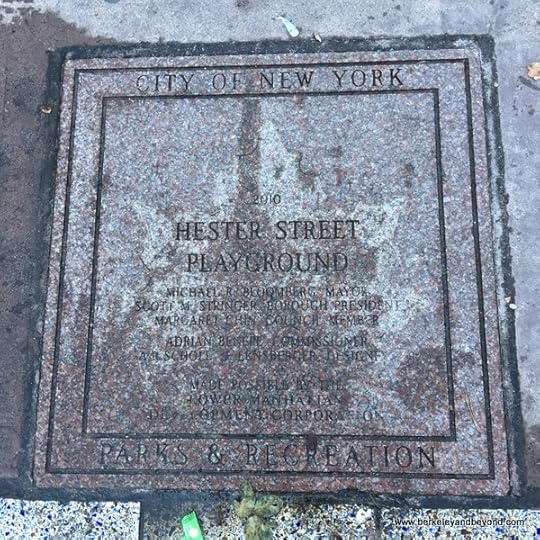 tile depicting Hester Street Playground in NYC
tile depicting Hester Street Playground in NYC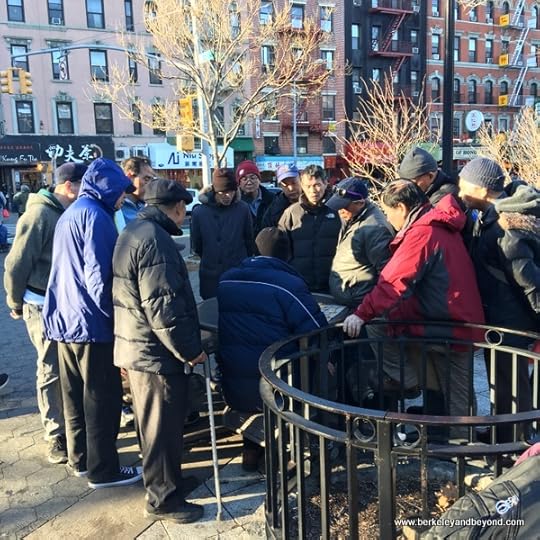 adults playing game outside Hester Street Playground in NYC
adults playing game outside Hester Street Playground in NYC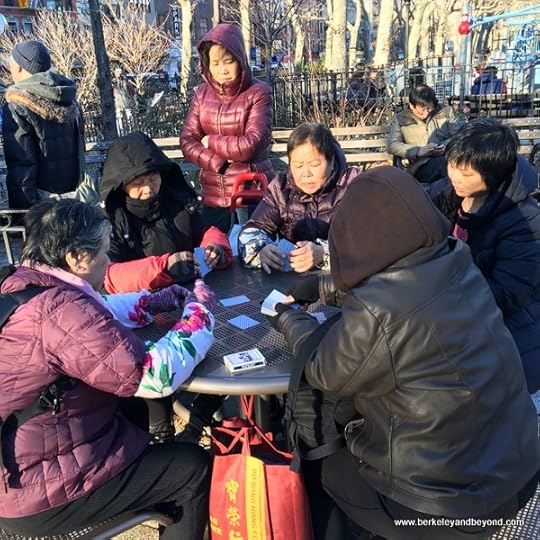 adults playing game outside Hester Street Playground in NYC
adults playing game outside Hester Street Playground in NYCMore things to do in NYC.
More travel articles to inspire you and help you plan some spectacular getaways.
images ©2017 Carole Terwilliger Meyers
Published on March 07, 2017 16:16
March 2, 2017
Stopover in LaPlace, Louisiana
STOPOVER IN LAPLACE
LaPlace is a convenient spot to overnight. I recommend you plan in a swamp tour here as well.
Holiday Inn Express & Suites La Place 4284 Hwy. 51, in LAPLACE, (985) 618-1600. Continental breakfast. Pool; coin laundry. This is a cog in the reliable chain and features really unusual bathroom plumbing.
Nobile’s Restaurant 2082 W. Main Street, in LUTCHER, (225) 869-8900. L M-F, D Thur-Sat. Built in 1895 during Louisiana’s lumber boom--this town harvested cypress--when it served as a bar and boarding house, this spacious restaurant features vintage high ceilings is a comfortable gathering place for locals. It retains a lovely Victorian mahogany bar that greets arrivals and has some interesting collectables as part of the decor. The menu offers Cajun and Creole dishes, including gumbo, seafood, and po’boys. I chose a crispy Caesar salad and an unusual appetizer plate of crawfish empanadas to go with my colorful Hurricane cocktail.
 front dining room in Nobile's Restaurant in Lutcher, Louisiana
front dining room in Nobile's Restaurant in Lutcher, Louisiana rustic paintings for sale in Nobile's Restaurant in Lutcher, Louisiana
rustic paintings for sale in Nobile's Restaurant in Lutcher, Louisiana Hurricane cocktail at Nobile's Restaurant in Lutcher, Louisiana
Hurricane cocktail at Nobile's Restaurant in Lutcher, Louisiana Caesar salad at Nobile's Restaurant in Lutcher, Louisiana
Caesar salad at Nobile's Restaurant in Lutcher, Louisiana crawfish empanadas at Nobile's Restaurant in Lutcher, Louisiana
[image error]
crawfish empanadas at Nobile's Restaurant in Lutcher, Louisiana
[image error]
Cajun Pride Swamp Tour 110 Frenier Road, in LAPLACE. Tours here glide through the legendary, privately owned Manchac Swamp, where you will see alligators, turtles, and a variety of birds. Seasoned guides introduce additional local flora and fauna as the pontoon boat meanders through the waterway, and they tell tales of hurricanes, survival, and the unique Louisiana culture. According to Captain Allen--our Cajun guide who sports a gravelly voice much like the late actor Redd Fox--whether you see alligators “depends on the temperature.” At 70-degrees plus they come out. Allen keeps alligators in his home as pets and sometimes brings one along for his riders to hold. If you’re real lucky, as I was, he will do this on the day you visit and you, like I did, might get to hold a two-foot-long baby alligator.
 Cajun Pride Swamp Tour in LaPlace, Louisiana
Cajun Pride Swamp Tour in LaPlace, Louisiana alligator spotted on Cajun Pride Swamp Tour in LaPlace, Louisiana
alligator spotted on Cajun Pride Swamp Tour in LaPlace, Louisiana egrets spotted on Cajun Pride Swamp Tour in LaPlace, Louisiana
egrets spotted on Cajun Pride Swamp Tour in LaPlace, Louisiana red cardinal spotted on Cajun Pride Swamp Tour in LaPlace, Louisiana
red cardinal spotted on Cajun Pride Swamp Tour in LaPlace, Louisiana Captain Allen holds alligator on Cajun Pride Swamp Tour in LaPlace, Louisiana
Captain Allen holds alligator on Cajun Pride Swamp Tour in LaPlace, Louisiana visitors hand off alligator on Cajun Pride Swamp Tour in LaPlace, Louisiana
visitors hand off alligator on Cajun Pride Swamp Tour in LaPlace, LouisianaNearby plantations.
More things to do in Louisiana.
More travel articles to inspire you and help you plan some spectacular getaways.
images ©2017 Carole Terwilliger Meyers
Published on March 02, 2017 13:50
February 28, 2017
Sights to See: Destrehan Plantation, Destrehan, Louisiana
Destrehan Plantation 13034 River Road, in DESTREHAN, (877) 453-2095, (985) 764-9315. The oldest documented plantation in lower Mississippi, this fully restored property dates to 1787. It started as an indigo plantation, and then in 1804 became the largest sugar plantation in the area. A 10-minute video viewed in the brick-wall and brick–floor Cooling Room orients visitors for the 1-hour guided tour of the Big House—which began as a French Colonial in the 1790s, but was later remodeled into a Greek Revival--after which visitors can explore on their own. Costumed guides, who refer to themselves as “interpreters of history,” interpret the legacy of the Destrehan family and point out the unique architectural features of their home, which being a country house was not so grand. But though it had sparse furnishings, it was clean and well maintained. The focus here is on stories, so you’ll learn about the French family whole lived here, as well as about Marguerite--the cook and laundress slave born in 1740. You’ll also see an original document signed by Thomas Jefferson and James Madison. Period craft demonstrations occur daily and include open-hearth cooking, indigo dyeing, sugar-cane processing, weaving, 1780s carpentry, and African-American herbal remedies.
 Big House at Destrehan Plantation in Destrehan, Louisiana
Big House at Destrehan Plantation in Destrehan, Louisiana 240-year-old live oak tree at Destrehan Plantation in Destrehan, Louisiana
240-year-old live oak tree at Destrehan Plantation in Destrehan, Louisiana costumed guide at Destrehan Plantation in Destrehan, Louisiana
costumed guide at Destrehan Plantation in Destrehan, Louisiana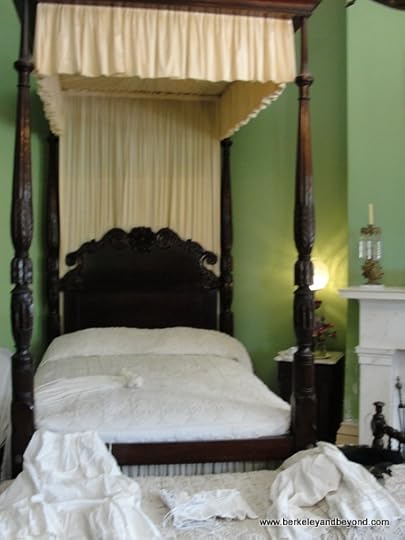 bedroom at Destrehan Plantation in Destrehan, Louisiana
bedroom at Destrehan Plantation in Destrehan, Louisiana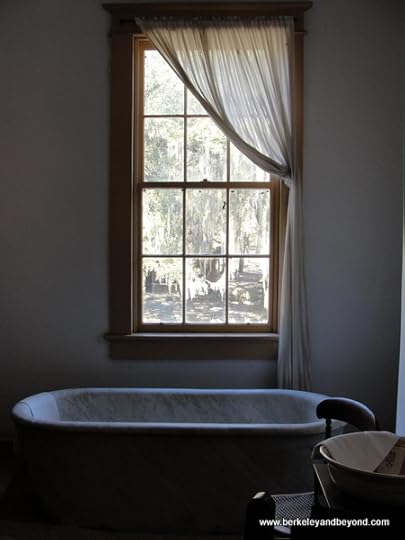 bathroom at Destrehan Plantation in Destrehan, Louisiana
bathroom at Destrehan Plantation in Destrehan, Louisiana detail from painting at Destrehan Plantation in Destrehan, Louisiana
detail from painting at Destrehan Plantation in Destrehan, Louisiana demo of 1780s carpentry at Destrehan Plantation in Destrehan, Louisiana
demo of 1780s carpentry at Destrehan Plantation in Destrehan, LouisianaMore plantations.
More things to do in Louisiana.
More travel articles to inspire you and help you plan some spectacular getaways.
images ©2017 Carole Terwilliger Meyers
Published on February 28, 2017 14:28
February 23, 2017
Sights to See: Whitney Plantation, Wallace, Louisiana
Whitney Plantation 5099 River Rd./Hwy. 18, in WALLACE, (225) 265-3300. Dedicated now to telling the story of slavery, this former indigo, then sugar plantation is on the National Register of Historic Places. The focus here is on the lives of the plantation’s slaves in the 1830s and the story is told through their eyes. The tour is mostly outside and begins with a memorial site where names are etched into shiny granite walls. This spot is meant to be a place to contemplate and grieve, and it records the names of 107,000 people held in bondage in Louisiana from 1719 to 1820. Another area known as The Field of Angels memorializes the 2,200 children who died in this parish.
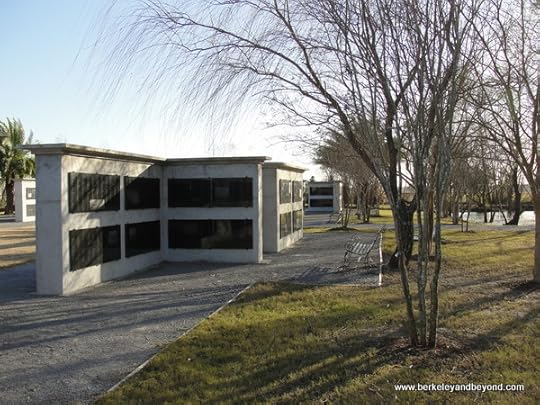 memorial overview at Whitney Plantation in Wallace, Louisiana
memorial overview at Whitney Plantation in Wallace, Louisiana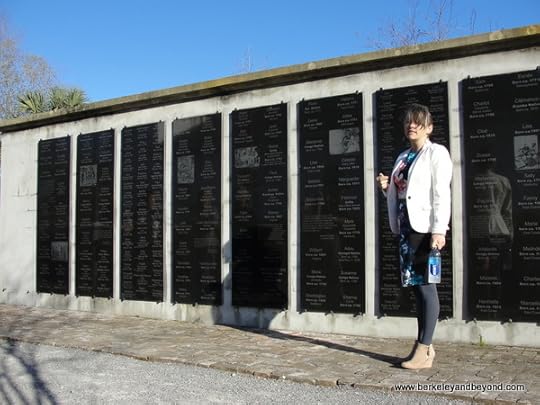 memorial plus guide at Whitney Plantation in Wallace, Louisiana
memorial plus guide at Whitney Plantation in Wallace, Louisianamemorial name detail at Whitney Plantation in Wallace, Louisiana
memorial picture and name detail at Whitney Plantation in Wallace, Louisiana
During the walking tour, visitors see both the last surviving example of a French Creole barn and the oldest detached kitchen in Louisiana. The Big House is considered the earliest and best-preserved raised Creole cottage in Louisiana and is furnished with era pieces, but it is in great need of repairs and access is poor. All of these structures were built by slaves.
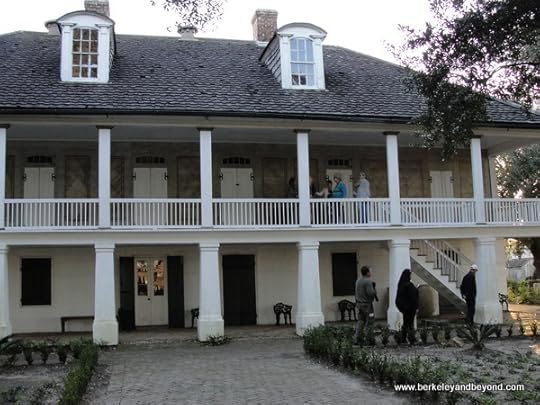 Big House at Whitney Plantation in Wallace, Louisiana
Big House at Whitney Plantation in Wallace, Louisiana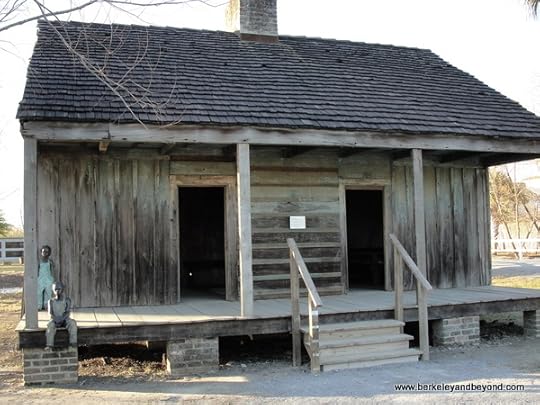 slave cabin with child sculptures at Whitney Plantation in Wallace, Louisiana
slave cabin with child sculptures at Whitney Plantation in Wallace, LouisianaA picturesque small church with a tall steeple was moved here from across the river. It is now populated with child sculptures, by Woodrow Nash, that represent slaves who were freed and whose stories are told here.
 exterior of church at Whitney Plantation in Wallace, Louisiana
exterior of church at Whitney Plantation in Wallace, Louisiana
 child sculptures by Woodrow Nash, inside church at Whitney Plantation in Wallace, Louisiana
child sculptures by Woodrow Nash, inside church at Whitney Plantation in Wallace, LouisianaMore plantations.
More things to do in Louisiana.
More travel articles to inspire you and help you plan some spectacular getaways.
images ©2017 Carole Terwilliger Meyers
Published on February 23, 2017 11:31
February 21, 2017
Sights to See: Evergreen Plantation, Edgard, Louisiana
Evergreen Plantation 4649 River Rd./Hwy. 18, in EDGARD, (985) 497-3837. One of the largest and most intact plantation complexes in the South, Evergreen is still a working sugarcane plantation. It has 37 buildings on the National Register of Historic Places. Most are antebellum, and 22 rare slave cabins in original double-row configuration are included. People still live and work here. As you tour the grounds, don’t miss a stroll through an allée of moss-draped 100- to 200-year-old live oaks. Historically, indigo was the first crop on this plantation, then came sugar cane and some rice. Still a private residence, the main house was originally French Creole style, then remodeled to Greek Revival. No furnishings are original to the house, and currently it is furnished with no particular style. It was prominently featured in the 2012 movie “Django Unchained,” and parts of the new 2016 version of “Roots,” starring Forest Whitaker, were filmed in the kitchen.
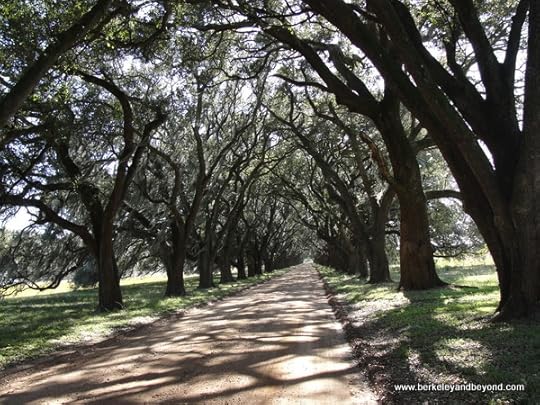 live oak allee at Evergreen Plantation in Edgard, Louisiana
live oak allee at Evergreen Plantation in Edgard, Louisiana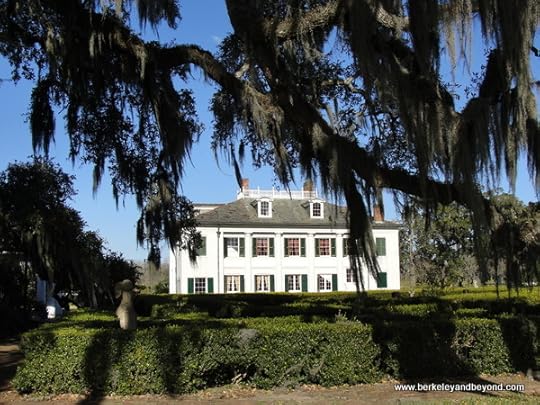 plantation house at Evergreen Plantation in Edgard, Louisiana
plantation house at Evergreen Plantation in Edgard, Louisiana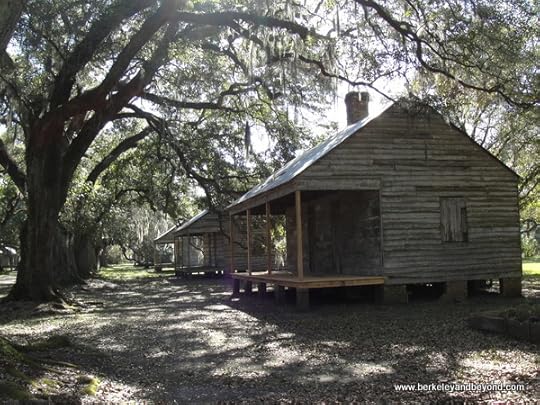 slave cabins at Evergreen Plantation in Edgard, Louisiana
slave cabins at Evergreen Plantation in Edgard, Louisiana gigantic tree at Evergreen Plantation in Edgard, Louisiana
gigantic tree at Evergreen Plantation in Edgard, LouisianaMore plantations.
More things to do in Louisiana.
More travel articles to inspire you and help you plan some spectacular getaways.
images ©2017 Carole Terwilliger Meyers
Published on February 21, 2017 12:33
February 16, 2017
Sights to See + Good Eats: Laura Plantation + B&C Seafood, Vacherie, Louisiana
Laura Plantation 2247 River Rd./Hwy. 18, in VACHERIE, (888) 799-7690, (225) 265-7690. Guided tours daily 10am-4pm; $20. No lodging. Based on 5,000 pages of documents from the French National Archives that are related to both the free and enslaved families who lived on this centuries-old sugar cane farm, and also incorporating original resident Laura’s own book “Memories of the Old Plantation Home,” the tour here features professional guides who share compelling, real-life accounts of seven generations of Creole inhabitants. This plantation has the largest collection of family artifacts original to a Louisiana plantation. Life here wasn’t all hoopskirts and mint juleps or convoluted relationships and intrigue. Here it was Creole-style austere. For instance, by tradition marriage was proposed with a fan, not a diamond ring. Twelve buildings are on the National Register, and many are 19th-century Creole-style that are raised off the ground on square brick pillars while others are 210-year-old West African bricks-between-posts construction. Built in 1805 and situated on a fault line with a natural ridge high point, this site never flooded. The property has a tropical feel, with palm trees and a banana forest that is sometimes shriveled and dry from cold winter weather. The west-African stories that inspired “Tales of Brer Rabbit” were originally recorded in this region and are thought to have been originated in cabins here.
 Laura Plantation store in Vacherie, Louisiana
Laura Plantation store in Vacherie, Louisiana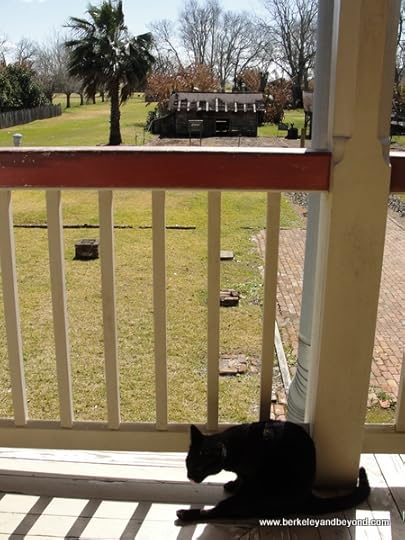 cat's-eye view from plantation house at Laura Plantation in Vacherie, Louisiana
cat's-eye view from plantation house at Laura Plantation in Vacherie, Louisiana  dry banana forest at Laura Plantation in Vacherie, Louisiana
dry banana forest at Laura Plantation in Vacherie, Louisiana 19th-century Creole-style out building that is raised off the ground on square brick pillars, at Laura Plantation in Vacherie, Louisiana
19th-century Creole-style out building that is raised off the ground on square brick pillars, at Laura Plantation in Vacherie, Louisiana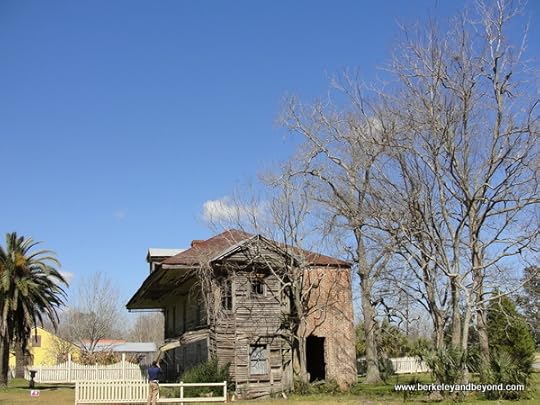 out building at Laura Plantation in Vacherie, Louisiana
out building at Laura Plantation in Vacherie, Louisiana portraits of former residents at Laura Plantation in Vacherie, Louisiana
portraits of former residents at Laura Plantation in Vacherie, Louisiana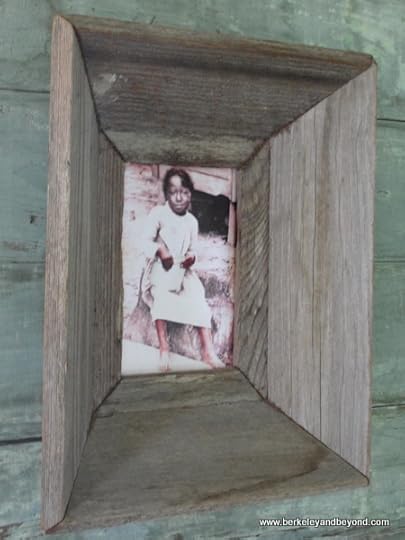 portrait of former resident at Laura Plantation in Vacherie, Louisiana
portrait of former resident at Laura Plantation in Vacherie, Louisiana  crawfish mound at Laura Plantation in Vacherie, Louisiana
crawfish mound at Laura Plantation in Vacherie, LouisianaB&C Seafood 2155 River Rd./Hwy. 18, (225) 265-8356, in VACHERIE. M-Sat 11am-4:30pm. Located right next door to Laura Plantation, so close that you can easily walk on over, B&C provides some of the area's best Cajun and Creole seafood. According to one regular, it is “the only restaurant in the state of Louisiana that serves Alka-Seltzer for dessert.” Diners pass through the fish market in front to reach the large dining room in back. Fried plate lunches are primo and include combos—I had catfish, prawns, and particularly delicious hushpuppies—and the menu also offers fried alligator, boudin balls, stuffed potatoes, gumbo, po-boys, and plenty more.
 exterior of B&C Seafood in Vacherie, Louisiana
exterior of B&C Seafood in Vacherie, Louisiana fish market at B&C Seafood in Vacherie, Louisiana
fish market at B&C Seafood in Vacherie, Louisiana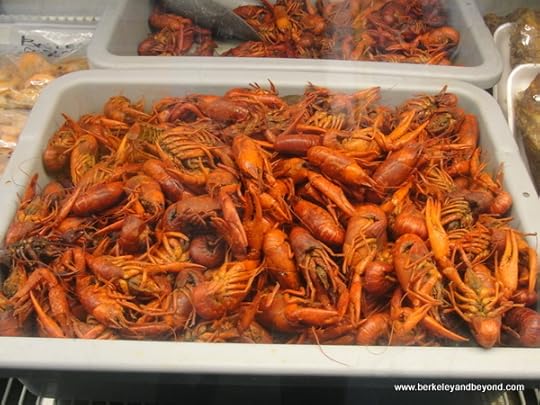 fresh crawfish at B&C Seafood in Vacherie, Louisiana
fresh crawfish at B&C Seafood in Vacherie, Louisiana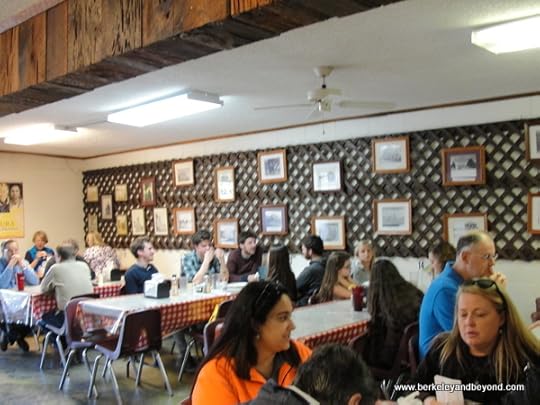 dining room at B&C Seafood in Vacherie, Louisiana
dining room at B&C Seafood in Vacherie, Louisiana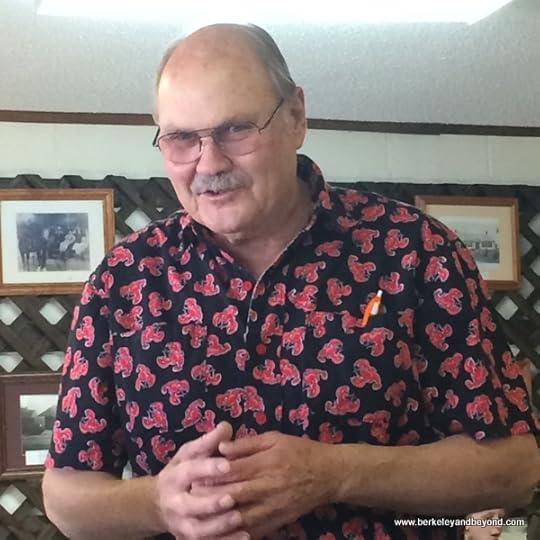 owner of B&C Seafood in Vacherie, Louisiana
owner of B&C Seafood in Vacherie, Louisiana Abita root beer at B&C Seafood in Vacherie, Louisiana
Abita root beer at B&C Seafood in Vacherie, Louisiana salad at B&C Seafood in Vacherie, Louisiana
salad at B&C Seafood in Vacherie, Louisiana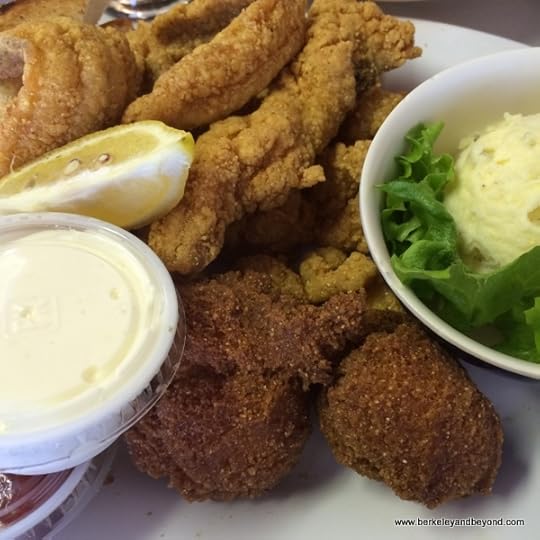 fried combo at B&C Seafood in Vacherie, Louisiana
[image error]
fried combo at B&C Seafood in Vacherie, Louisiana
[image error]
More plantations.
More things to do in Louisiana.
More travel articles to inspire you and help you plan some spectacular getaways.
images ©2017 Carole Terwilliger Meyers
Published on February 16, 2017 12:46
February 14, 2017
Sights to See: Oak Alley Plantation, Vacherie, Louisiana
Oak Alley Plantation 3645 River Rd./Hwy. 18, in VACHERIE, (800) 442-5539. Tours 9-5; $10. Lodging $104-$135, includes breakfast. This exceptional property is entered from the river road through a dramatic, and much-filmed, quarter-mile alley tree tunnel of 300-year-old oak trees (there are 28 of them spaced 80 feet apart in two equal rows). Movies filmed here include “The Long Hot Summer,” “Interview with the Vampire,” and “Hush, Hush, Sweet Charlotte,” as well as Beyonce’s “Déjà Vu” music video. The house tour tells about the Romans family that built the plantation. Outside, a self-guided tour continues through the “Slavery at Oak Alley” exhibit. Spread through six cabins, it provides insight into the lives and importance of those who were enslaved here. Also of special interest are The Sugarcane Theater, which shows a short video explaining how sugarcane is processed into sugar, and a Blacksmith Shop with an 1800s-era forge and live demonstrations.
 oak tree alley at Oak Alley Plantation in Vacherie, Louisiana
oak tree alley at Oak Alley Plantation in Vacherie, Louisiana plantation house at Oak Alley Plantation in Vacherie, Louisiana
plantation house at Oak Alley Plantation in Vacherie, Louisiana dining room in plantation house at Oak Alley Plantation in Vacherie, Louisiana
dining room in plantation house at Oak Alley Plantation in Vacherie, Louisiana reading belle in plantation house at Oak Alley Plantation in Vacherie, Louisiana
reading belle in plantation house at Oak Alley Plantation in Vacherie, Louisiana children's bedroom in plantation house at Oak Alley Plantation in Vacherie, Louisiana
children's bedroom in plantation house at Oak Alley Plantation in Vacherie, Louisiana slave cabin at Oak Alley Plantation in Vacherie, Louisiana
slave cabin at Oak Alley Plantation in Vacherie, LouisianaHoused in a 19th-century cottage, Oak Alley Restaurant serves a particularly tasty breakfast enhanced by what must be the very best beignets around.
 best beignets around in restaurant at Oak Alley Plantation in Vacherie, Louisiana
best beignets around in restaurant at Oak Alley Plantation in Vacherie, LouisianaBoth new and century-old cottages are available on the outskirts of the property to spend the night in. Breakfast in the restaurant is included.
 guest cottages at Oak Alley Plantation in Vacherie, Louisiana
guest cottages at Oak Alley Plantation in Vacherie, LouisianaMore plantations.
More things to do in Louisiana.
More travel articles to inspire you and help you plan some spectacular getaways.
images ©2017 Carole Terwilliger Meyers
Published on February 14, 2017 13:45
February 9, 2017
Sights to See: Houmas House Plantation and Gardens, Darrow, Louisiana
Houmas House Plantation and Gardens 40136 River Road/Hwy. 942, in Darrow, (225) 473-9380, (225) 473-7841. Tours daily 9am-7pm. Once part of a sugar cane farm, this grand Greek revival plantation home began as a three-room cottage. It is now known for the 40 acres of magnificent gardens that surround it, and something is always in bloom. Sugar kettles, converted into small ponds, dot the premises. Giant oak trees in front channel breezes into the house. Allow time to stroll the gardens before or after your house tour led by a costumed tour guide who describes the plantation’s unique history, people, and culture.
 garden fountain at Houmas House Plantation and Gardens in Darrow, Louisiana
garden fountain at Houmas House Plantation and Gardens in Darrow, Louisiana drum bridge at Houmas House Plantation and Gardens in Darrow, Louisiana
drum bridge at Houmas House Plantation and Gardens in Darrow, LouisianaThe art and antique furnishings here are posh and spectacular, and a few are original to the house. Highlights include a striking mural in the mansion's entry, which was painted by the head groundskeeper--who is also a talented artist and runs The Art Noir gallery on-site.
 costumed guide by interior grand staircase Houmas House Plantation and Gardens in Darrow, Louisiana
costumed guide by interior grand staircase Houmas House Plantation and Gardens in Darrow, Louisiana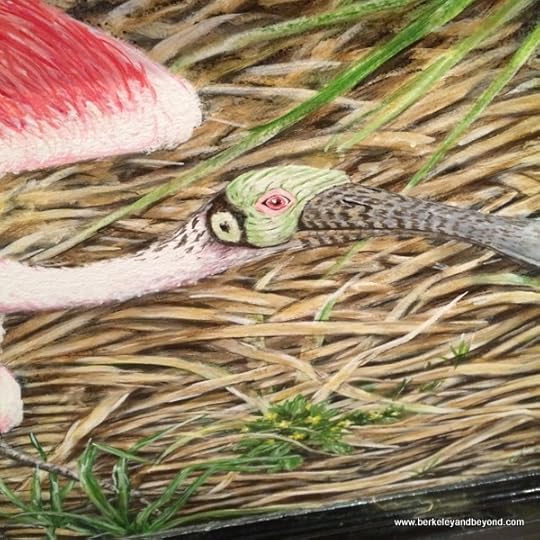 detail of contemporary mural at Houmas House Plantation and Gardens in Darrow, Louisiana
detail of contemporary mural at Houmas House Plantation and Gardens in Darrow, LouisianaA gold clock that once belonged to Marie Antoinette and then Napoleon now resides on the mantle,
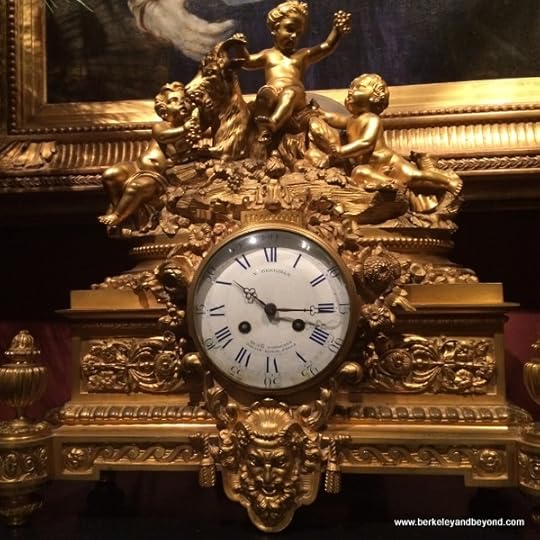 antique gold clock at Houmas House Plantation and Gardens in Darrow, Louisiana
antique gold clock at Houmas House Plantation and Gardens in Darrow, Louisianaand a 68-pound solid-silver rendering of Abraham Lincoln made by American sculptor Gutzon Borglum, who also chiseled the giant heads at Mt. Rushmore, sits calmly in the drawing room (don’t miss your chance to rub his nose for good luck).
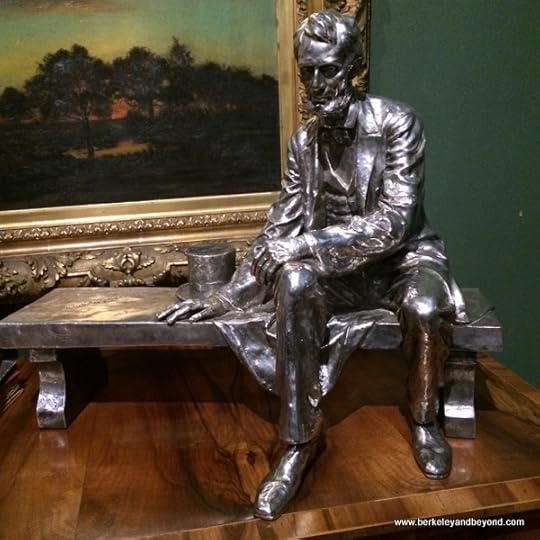 silver sculpture of Abraham Lincoln at Houmas House Plantation and Gardens in Darrow, Louisiana
silver sculpture of Abraham Lincoln at Houmas House Plantation and Gardens in Darrow, LouisianaAnd an original Gauguin graces a wall.
 Gauguin painting at Houmas House Plantation and Gardens in Darrow, Louisiana
Gauguin painting at Houmas House Plantation and Gardens in Darrow, Louisiana painting at Houmas House Plantation and Gardens in Darrow, Louisiana
painting at Houmas House Plantation and Gardens in Darrow, LouisianaPlus, upstairs you’ll see the bed where Bette Davis slept while filming “Hush, Hush, Sweet Charlotte” here, as well as a vampire slaying kit from the collection of author Anne Rice.
 the Bette Davis bed at Houmas House Plantation and Gardens in Darrow, Louisiana
the Bette Davis bed at Houmas House Plantation and Gardens in Darrow, LouisianaThe Carriage House restaurant is a splendid room. Sitting in it is divine, and the food matches the surroundings. Afternoon tea is served, and you can enjoy a casual but elegant dinner here. My own meal was a bland local seafood gumbo with a potent French martini cocktail and a soft white-chocolate bread pudding ending.
 Carriage House restaurant at Houmas House Plantation and Gardens in Darrow, Louisiana
Carriage House restaurant at Houmas House Plantation and Gardens in Darrow, Louisiana gumbo at Carriage House restaurant at Houmas House Plantation and Gardens in Darrow, Louisiana
gumbo at Carriage House restaurant at Houmas House Plantation and Gardens in Darrow, LouisianaAn annex near the kitchen features taxidermy animal heads galore.
 room with taxidermy heads at Houmas House Plantation and Gardens in Darrow, Louisiana
room with taxidermy heads at Houmas House Plantation and Gardens in Darrow, LouisianaTucked at the other end of this restaurant, behind a giant 600-year-old live oak tree that has been struck by lightning several times, the cozy Turtle Bar is the perfect spot for a before or after dinner drink. Also, Cafe Burnside is open daily for lunch and Sunday brunch, and in the Old French House, Latil’s Landing, offers fine dining dinners.
 Turtle Bar at Houmas House Plantation and Gardens in Darrow, Louisiana
Turtle Bar at Houmas House Plantation and Gardens in Darrow, LouisianaNew cottages are situated sort of like the slave quarters were on plantations in times past--always in two rows, always on the outskirts of the property. Built in 2012, The Inn at Houmas House is a collection of 6 luxuriously appointed cottage buildings with 21 rooms situated along a 300-year-old allee of ancient oaks. Exteriors feature Doric columns and mimic planters' homes of the 1800s, and guests are provided rocking chairs so they can sit on their shaded porch and enjoy a gentle breeze off the Mississippi River. A mixture of antiques and modern amenities decorated the attractive guest rooms, and each has a unique theme. Bell service and transportation around the property is handled with golf carts. Two complimentary house-tour tickets are included with each guest room.
 cottage at Inn at Houmas House Plantation and Gardens in Darrow, Louisiana
cottage at Inn at Houmas House Plantation and Gardens in Darrow, Louisiana guest room at Inn at Houmas House Plantation and Gardens in Darrow, Louisiana
guest room at Inn at Houmas House Plantation and Gardens in Darrow, LouisianaMore plantations.
More things to do in Louisiana.
More travel articles to inspire you and help you plan some spectacular getaways.
images ©2017 Carole Terwilliger Meyers
Published on February 09, 2017 14:51
February 8, 2017
Sights to See: River Road Drive Plantations, Baton Rouge to New Orleans, Louisiana
Grand plantations stretch along River Road Drive, following the Mississippi River for about 45 miles from New Orleans to Baton Rouge. High levees continue to protect the properties from the Mississippi River. The area was nicknamed “The Sugar Coast” because of the extensive sugar cane fields found here, many of which are still attached to old plantations. Once, more than 2,000 plantations lined the Mississippi River along this winding road. Today, most are gone. Only about 100 remain, and of those only 20 are open to the public. Each tells a unique story and offers guided tours, and some have restaurants and/or overnight lodging.
 Houmas House Plantation in Louisiana
Houmas House Plantation in LouisianaAs you travel through the parishes of St. James, St. John the Baptist, and St. Charles, in addition to majestic plantation homes you’ll find mysterious swamps and some excellent Cajun/Creole cuisine.
Organized tours that visit plantations vary. An option is spending half a day touring two plantations and the other half exploring Cajun Country and the swamps. Some will pick you up by van from your hotel, others have a central meeting point. Some are by bus, and some are by boat. And, of course, you can drive it yourself.
 costumed docent at Destrehan Plantation in Louisiana
costumed docent at Destrehan Plantation in LouisianaOver the next few weeks, I’ll be blogging here about 6 plantations that are open to the public:
Destrehan Plantation
Evergreen Plantation
Houmas House Plantation and Gardens
Laura Plantation
Oak Alley Plantation
Whitney Plantation
More things to do in Louisiana.
More travel articles to inspire you and help you plan some spectacular getaways.
images ©2017 Carole Terwilliger Meyers
 oak alley at Oak Alley Plantation in Louisiana
oak alley at Oak Alley Plantation in Louisiana
Published on February 08, 2017 11:11
January 31, 2017
Good Eats: Chun Shui Tang Cultural Tea House, Taichung, Taiwan
Chun Shui Tang Cultural Tea House Cold pearl milk tea—also known in the U.S. as bubble or boba tea--originated in the early 1980s. To be precise, Mr. Liu Han-Chieh invented bubble tea here in his Taiwan tea house. He came up with the idea of serving tea cold during a visit to Japan where he saw coffee served cold. In Taiwan, bubble tea is a foamy, cold black Chinese tea mixed with ice and sometimes milk. It does not include tapioca balls. Another guy in this shop invented pearl tea, which mixes tea with fresh tapioca balls and sometimes include milk. Tapioca balls can be added to any cold drink in this tea house for a small additional charge.
 ad for DIY Boba Tea at Chun Shui Tang Cultural Tea House in Taichung, Taiwan
ad for DIY Boba Tea at Chun Shui Tang Cultural Tea House in Taichung, Taiwan entry at Chun Shui Tang Cultural Tea House in Taichung, Taiwan
entry at Chun Shui Tang Cultural Tea House in Taichung, TaiwanI found myself here for the do-it-yourself workshop that teaches you how to make both types of cold tea. My lesson began with making bubble black tea—the original cold Chinese tea. Using a precise recipe, we started with 70 cubic centimeters of strong-brewed black tea from Sri Lanka. To the shaker, we added ice over the top, so it was like a mountain, then poured 20 cubic centimeters of liquid cane sugar over the ice, added the tea, and closed the shaker. We then shook it forcefully, out and away from our bodies, for 33 shakes. The collision of liquid with ice creates bubbles--thus the name. We poured our liquid in a drinking cup and compared the foam with the other participants, then drank.
The second part of the lesson taught us how to prepare pearl milk tea, the shop’s best seller and my personal favorite. I adore pearl tea. First we compared the powdery, fresh grey pearls that this shop uses (they last only a few days in the refrigerator) with the hard, dried-out, toasted-looking pearls that many other shops use (they can last unrefrigerated for 2 or 3 years!). (It was interesting to learn that tapioca grows underground on the root of a tree. About the size of a yam, it is often called a tree potato.) For this concoction, an even stronger black tea is used so that the pearls don’t overpower the taste of the tea. The recipe is the same, except that 1 spoon of dried milk is added into the shaker with the tea and whisked until dissolved. After shaking the shakers like they are maracas, we pour the liquid over 2 teaspoons of tapioca balls and stir. Yum.
 set-up for DIY boba tea at Chun Shui Tang Cultural Tea House in Taichung, Taiwan
set-up for DIY boba tea at Chun Shui Tang Cultural Tea House in Taichung, Taiwan instructor Dora Cheng for DIY boba tea at Chun Shui Tang Cultural Tea House in Taichung, Taiwan
instructor Dora Cheng for DIY boba tea at Chun Shui Tang Cultural Tea House in Taichung, Taiwan fresh tapioca pearls for DIY boba tea at Chun Shui Tang Cultural Tea House in Taichung, Taiwan
fresh tapioca pearls for DIY boba tea at Chun Shui Tang Cultural Tea House in Taichung, Taiwan finished pearl tea at DIY workshop at Chun Shui Tang Cultural Tea House in Taichung, Taiwan
finished pearl tea at DIY workshop at Chun Shui Tang Cultural Tea House in Taichung, TaiwanAfter, we had the option of staying on for lunch, which we did. I ordered the #279 vegetarian handmade thin noodles, which were delicious and just the right amount of food. The most popular lunch item on the menu is #198, Kung-Fu noodles with minced pork and mushrooms. I accompanied my noodles with the #819 chocolate milk tea with pearls. The medium portion was huge and chocolatey, with chocolate shavings floating on top, and could easily have passed for a dessert. I shared it with others and still wasn’t able to finish it. The most popular tea here is the #6 pearl milk tea.
 #279 vegetarian handmade thin noodles at Chun Shui Tang Cultural Tea House in Taichung, Taiwan
#279 vegetarian handmade thin noodles at Chun Shui Tang Cultural Tea House in Taichung, Taiwan #819 chocolate milk tea with pearls at Chun Shui Tang Cultural Tea House in Taichung, Taiwan
#819 chocolate milk tea with pearls at Chun Shui Tang Cultural Tea House in Taichung, TaiwanMore things to do in Taiwan.
More things to do in Taichung.
Travel articles to inspire and help you plan some spectacular local and foreign getaways.
images ©2017 Carole Terwilliger Meyers
Published on January 31, 2017 12:42
Carole Terwilliger Meyers's Blog
- Carole Terwilliger Meyers's profile
- 1 follower
Carole Terwilliger Meyers isn't a Goodreads Author
(yet),
but they
do have a blog,
so here are some recent posts imported from
their feed.



